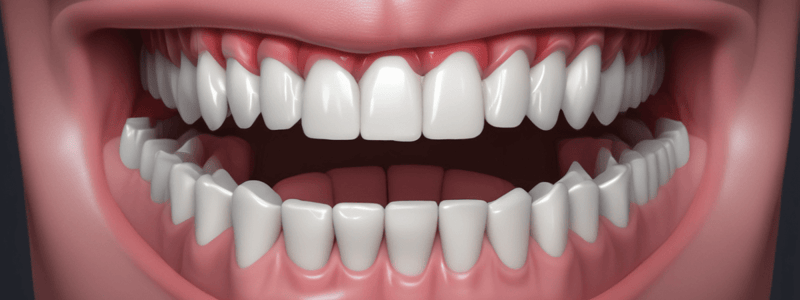Podcast
Questions and Answers
In the primary teeth numbering system, where does the naming start from?
In the primary teeth numbering system, where does the naming start from?
- Lower arch right side
- Lower arch left side
- Upper arch right side (correct)
- Upper arch left side
What is the total number of teeth numbered in the permanent teeth numbering system?
What is the total number of teeth numbered in the permanent teeth numbering system?
- 30
- 36
- 28
- 32 (correct)
What is the purpose of the FDI numbering system?
What is the purpose of the FDI numbering system?
- To record information on the health of a patient's teeth (correct)
- To identify the type of teeth
- To examine the patient's gums
- To determine the age of the patient
In the FDI system, how is the mouth divided for adults?
In the FDI system, how is the mouth divided for adults?
What is the notation used in the FDI system?
What is the notation used in the FDI system?
What is the number of the tooth referred to as #11 in the Universal system?
What is the number of the tooth referred to as #11 in the Universal system?
What is the primary purpose of a tooth numbering system?
What is the primary purpose of a tooth numbering system?
What is the name of the oldest and most widely used tooth numbering system?
What is the name of the oldest and most widely used tooth numbering system?
How many quadrants do dentists divide the whole dentition into?
How many quadrants do dentists divide the whole dentition into?
Who developed the idea of the Zsigmondy-Palmer system?
Who developed the idea of the Zsigmondy-Palmer system?
What is the purpose of the Zsigmondy cross in the Zsigmondy-Palmer system?
What is the purpose of the Zsigmondy cross in the Zsigmondy-Palmer system?
What is the name of the system proposed by German dentist Julius Parreidt?
What is the name of the system proposed by German dentist Julius Parreidt?
When was the Universal Numbering System accepted and approved by the American Dental Association (ADA)?
When was the Universal Numbering System accepted and approved by the American Dental Association (ADA)?
Who named the Palmer notation system?
Who named the Palmer notation system?
Flashcards are hidden until you start studying
Study Notes
Tooth Numbering Systems
- A tooth numbering system is used by dentists to identify and specify information about a particular tooth, allowing for easy identification, communication, and dental record maintenance.
Types of Tooth Numbering Systems
- There are three commonly used systems: Zsigmondy-Palmer system, Universal Numbering System, and FDI system numbering system.
Dental Quadrants
- The whole dentition is divided into four quadrants or sections: upper right, upper left, lower right, and lower left.
Zsigmondy-Palmer System (┘└ ┐┌)
- Developed by Adolf Zsigmondy in 1861, using a Zsigmondy cross to record quadrants of tooth positions.
- Uses numbers for permanent teeth and Roman numerals (I, II, III, IV, V) for primary teeth.
- Consists of a symbol indicating the quadrant and a number indicating the position from the midline.
- Named after American dentist Dr. Corydon Palmer.
Universal Tooth Numbering System
- Proposed by German dentist Julius Parreidt in 1882 and accepted by the American Dental Association (ADA) in 1968.
- Used by dental professionals in America.
- For primary teeth: starts from the upper arch right side to left side, lettered A to J.
- For permanent teeth: assigned numbers sequentially, starting from the posterior most region of the upper first quadrant.
FDI System (Federation Dentaire Internationale)
- A two-digit system for both primary and permanent dentitions, also known as the ISO 3950 notation system.
- Used to record information on the health of a patient's teeth and share information with other oral health professionals.
- Orientation of the chart is traditionally "dentist's view".
- For adults: the mouth is divided into quadrants numbered from 1 to 4 clockwise from the dentist's view, with teeth numbered from 1 to 8.
- For children: the mouth is divided into quadrants numbered from 5 to 8 clockwise.
Studying That Suits You
Use AI to generate personalized quizzes and flashcards to suit your learning preferences.



